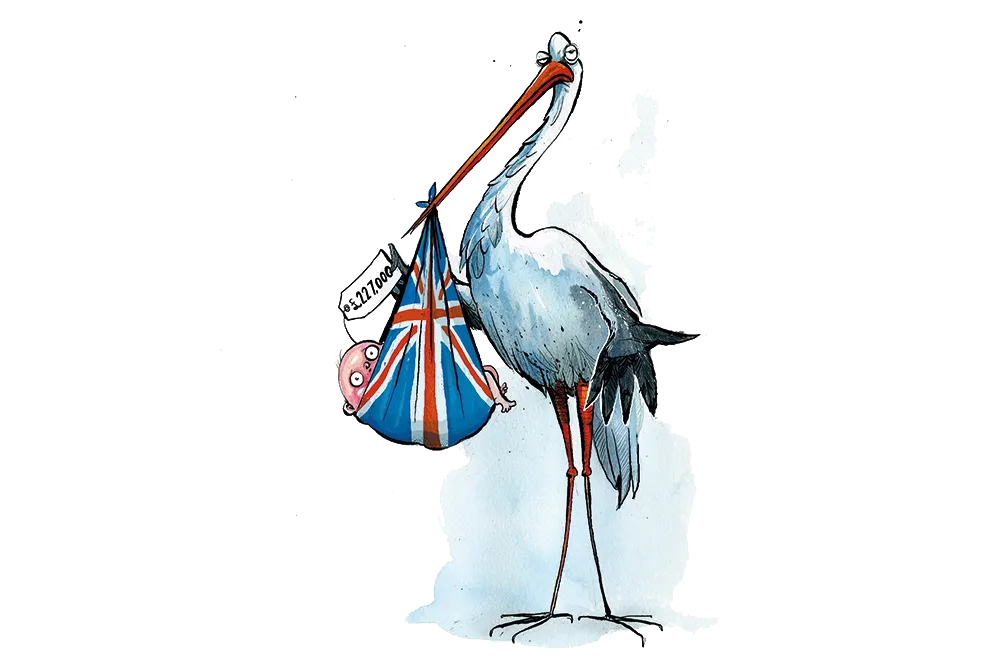
Stephen J. Shaw has narrated this article for you to listen to.
As the collapse of birthrates accelerates across the developed world, even our language is struggling to keep up. Over nine years of demographic research, I’ve resorted to coining my own vocabulary just to describe what’s unfolding. ‘Birthgap’, for the widening gulf between generations – too few young to support too many old. ‘Yesterlands’, for once-thriving communities now quietly hollowing out. ‘Retronomics’, for the slow yet continuous un-ravelling that follows demographic decline, as nations are forced to retrofit their economies to fit their shrunken societies.
Lately, I’ve been searching for another missing word – this time, to capture the invisible sense that a society still believes in its own tomorrow. The term I’ve settled on is ‘futurehood’: the unspoken, collective confidence that there will be a shared (and mostly positive) future. And I’ve come to believe that futurehood isn’t just ancillary to nationhood – it’s essential to it. This realisation hit me unexpectedly after arriving in a country that still possesses this sense of future in abundance.
After eight years living in Japan, a country where demographic decline has hardened into a quiet despondency, accepted by many as an unchangeable fact of life, I spent three months in Vietnam this summer and felt as though I’d stepped into another reality: a nation alive with youth, energy and pride.
My initial reaction, though, was less romantic. Pavements double as carparks for mopeds, there’s the ear-splitting sound of construction everywhere, and street crossings feel like acts of faith. The irony was hard to miss: a demographer preoccupied with solving the global birthrate crisis, yet selfishly unsettled by the very vitality so many nations now lack.
Vietnam is blessed with many things, from warm, welcoming people to a cuisine that, to me, rivals Japan’s. Other nations in the region can make similar claims – Thailand next door certainly can. But there was something different in Hanoi I couldn’t quite name, until I coined that word: futurehood. Quite simply, Vietnam has a future, and its people know it. Thailand, by contrast, has surrendered its tomorrow to ultra-low birthrates (under 1.2 children per woman), meaning the number of schools halving every 35 years.
Of course, Vietnam’s recent past is not an easy one. Its history is marked by decades of conflict and foreign interventions that have left deep scars across generations, even as the country moves forward. Yet against this backdrop, it has become a rapidly emerging economy, with all the hallmarks of progress. And its people, whether in the bustle of the cities I visited or in the most remote communities, share a quiet confidence. Their understated smiles can at first be hard to read, much like the chaotic streets that demand a leapof faith to cross. But beneath that calm lies a certainty: not just the hope of a better future, but the quiet confidence that their nation’s future is not in doubt.
In Vietnam I felt as though I’d stepped into another reality: a nation alive with youth, energy and pride
On 2 September, that exuberance reached its peak with the 80th anniversary of independence from France. Flags hung from balconies and offices, and were even anchored in the city’s lakes. Despite the onset of the rainy season, young couples and families enthusiastically staked out spots along the parade routes the night before. There was optimism, laughter and, evidently, a belief in their collective tomorrow. In a country with a very different form of governance, I saw more genuine pride and confidence in the future than in Britain, the supposed bastion of prosperity and stability I still call home.
When I came to Britain later in the month, I was greeted by flag-waving too – but not with cohesive pride. Instead, it came amid ‘flag wars’ over the Tommy Robinson march, transport chaos and a national mood of political despondency. After more than two decades living overseas, each return unsettles me more. London no longer feels like the city where I raised my young family: there seems to be more street crime than I remember, relentless redevelopment alongside the quiet erosion of communities and an ever-deepening sense of drift. And of course, Tube strikes – something that simply never happens in Japan. More and more I feel like a stranger in my own land.
However, as a demographer, my concern runs deeper than these cultural, economic or political shifts. Britain is rapidly losing its demographic futurehood. The latest ONS data put fertility at a record low for England and Wales – a full third below Replacement Level, or what I call the ‘Stability Level’, 2.1 children per woman. The UK has secured its position in the club of unsustainable nations, because fewer births mean fewer future mothers, and so on. At this level, the number of schools will halve every 50 years – and keep closing until birthrates stabilise again, which is far from certain, given no nation in history has been known to recover from this crisis.

Some argue immigration is the answer. It would be foolish to deny it has a place. However, whatever its merits, immigration cannot solve a birthrate crisis. It can disguise decline for a while, but it makes dependency permanent. Germany and Italy – two of Europe’s most immigrant-rich nations – still rank among the countries with the lowest fertility rates in the world. And the pool of potential migrants is shrinking fast. India, for example, reached ‘peak births’ in 2001. Thirty-one of its 36 states are below Stability Level. Soon enough, India will be searching for immigrants of its own.
Vietnam too may one day face this reckoning. For two decades it has hovered around the Stability Level, but birthrates are edging downward again. And late last month, Ho Chi Minh City, the country’s economic centre, announced new incentives for women to have a second child before the age of 35. Yet, for now at least, it’s sobering that I sense a greater confidence about the future from people living in Hanoi than I do in London or Tokyo.
Futurehood can probably be recovered by nations that have lost it, and I think demographic recovery depends on it. To get a sense of that, I’d recommend spending some time in Vietnam.








Comments